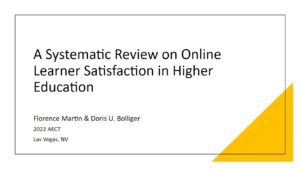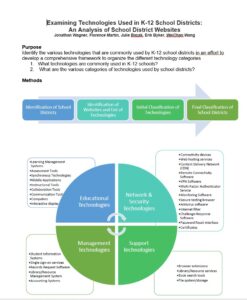Martin Presentations from AECT 2022
DDL- A Systematic Review on Online Learner Satisfaction in Higher Education
Florence Martin & Doris Bolliger
Satisfaction is a critical aspect of student success in online education. Presenters will report findings of a systematic review pertaining to online learner satisfaction in higher education. Ninety-eight scholarly articles that included original research between 2010 and 2018 and focused on online student satisfaction were analyzed in this review. Learner characteristics was the most examined theme, followed by engagement and course delivery. Program quality, assessment, and learner support were the least studied themes.
Link to Slides – https://docs.google.com/presentation/d/1dwcdWYyr5PMyDvldjc5hblthUMaqmXJB/edit#slide=id.p1
Martin, F., & Bolliger, D. (2022). Developing an Online Learner Satisfaction Framework in Higher Education Through a Systematic Review of Research. International Journal of Educational Technology in Higher Education, 19, 50, 1-21
DDL- Bichronous Online Learning: Award-Winning Online Instructor Practices of Blending Asynchronous and Synchronous Design, Facilitation, and Assessment
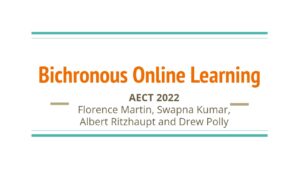
Florence Martin, Swapna Kumar, Albert Rtizhaupt & Drew Polly
Bichronous online learning is the intentional blending of asynchronous and synchronous modalities. In this qualitative study, 12 award-winning online instructors were interviewed for their online teaching practices. Data was collected through virtual interviews which were recorded, transcribed, and analyzed. This research examines how award-winning online instructors blend both asynchronous and synchronous components, and how they design, facilitate, and assess these bichronous online courses. Results provide in-depth descriptions along with promising new directions.
Link to Slides – https://docs.google.com/presentation/d/1A2svnSyJEjKn4xsx_ZGEBvENleq4QqDS_xZ6Y7VaD4I/edit#slide=id.p
Martin, F., Kumar, S., Ritzhaupt, A. D., & Polly, D. (2023). Bichronous online learning: Award-winning online instructor practices of blending asynchronous and synchronous online modalities. The Internet and Higher Education, 56, 100879.
DDL- Establishing a Student Evaluation of Online Teaching and Learning Framework through Analysis of Existing Instruments
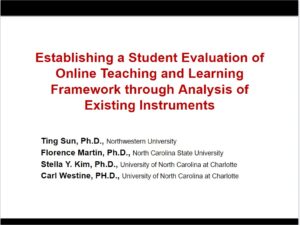
Ting Sun, Florence Martin, Stella Kim & Carl Westine
This presentation highlights a framework for student evaluation of online teaching and learning (SEOTL) through an analysis of SEOTL instruments implemented by universities and colleges from analyzing 27 instruments. We found that most instruments focus more on the Course and Instructor dimensions, with Instructor Facilitation and Learning Goals and Objectives elements occurring most frequently. However, Organization and Technology dimensions were least included. This study has implications for administrators, instructors, instructional designers, and students.
Link to Slides – https://docs.google.com/presentation/d/1DTPU10fRTjDCBfqZPNCPrMCmDU05SCHb
DDL- Impact of Distance and Online Learning: A Second-Order Meta-Analysis Study
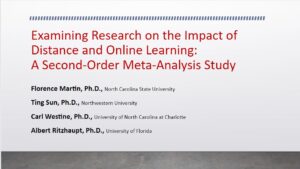
Florence Martin, Ting Sun, Carl Westine & Albert Ritzhaupt
In this second-order meta-analysis, we analyzed 19 first-order meta-analyses to examine the impact of distance and online learning on students’ cognitive, affective and behavioral outcomes. The findings revealed a statistically significant overall average effect size (g = 0.156, p < .001 with a 95% confidence interval of 0.087 to 0.224) of distance education impacting educational outcomes in comparison to face-to-face education. Meta-analyses on higher education had a statistically significant larger effect size than K-12 education.
Link to Slides – https://docs.google.com/presentation/d/1gCEUjYAZsvprB5COQhTC0cDFCs-_ODJl/edit#slide=id.p1
Martin, F., Sun, T., Westine, C., Ritzhaupt, A. D. (2022). Examining Research on the Impact of Distance and Online Learning: A Second-Order Meta-Analysis StudyEducational Research Review, 100438
OTP- An overview of the IBSTPI 2021 Instructor Competencies for face-to-face, blended, and online instructional environments
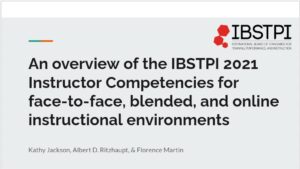
Kathy Jackson, Albert Ritzhaupt & Florence Martin
The purpose of this research is to share the validation results associated with the IBSTPI 2022 Instructor Competencies. The published set includes more than 150 evidence-based performance statements within 19 competencies organized into four domains by core, online, and blended instructional environments: 1) Foundation, 2) Design, 3) Facilitation, and 4) Evaluation. The competencies were assessed by N = 578 seasoned instructors across the globe. We present the validation results and highlight use cases for these competencies.
Link to Slides – https://docs.google.com/presentation/d/1fs8u-7XFni40gCOp3PHwHzJiSnHyi4_R/edit#slide=id.p1
TIL- Examining Technologies Used in K-12 School Districts: An Analysis of School District Websites
Jonathan Wagner, Florence Martin, Julie Bacak, Erik Byker & Weichao Wang
In this presentation, we share findings from an analysis of 23 school district websites for technologies used in a number of K-12 school districts surrounding a public, research university in a Southeast region of the United States. We propose a technology classification framework including educational technologies, management technologies, support technologies, networking technologies, and security technologies in addition to identifying various technologies that are currently used by school districts based on this framework
Link to Handout – https://docs.google.com/document/d/1Xpa0u9w4AGYRiSqvmByAp6q5jYFfR5cD/edit
STUDENT LED PRESENTATIONS
DDL- Systematic Review (2000 to 2021) of Online Accessibility Research in Higher Education
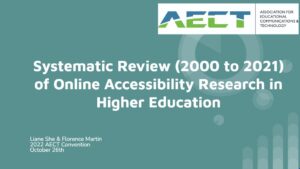
Liane She & Florence Martin
An important aspect of online learning in higher education is the need for accessibility for all students with disability of any kind. This systematic review analyzed 95 research studies from 2000 to 2021, focusing on the use of different accommodations for design, facilitation, and assessment in online learning. Four research focus areas emerged and several accommodations are also presented for accessibility design, facilitation and implementation. Implications for various stakeholders are presented.
Link to Slides – https://docs.google.com/presentation/d/1Yj8w6-d83ZTNdTVujPra7qrRQWqh0fIS6Lw68slMimA/edit#slide=id.p
She, L., & Martin, F. (Online First). Systematic Review (2000 to 2021) of Online Accessibility Research in Higher Education. American Journal of Distance Education.
D&D- Design Knowledge and Practice Examined through Student, Instructor, and Environmental Contextual Factors
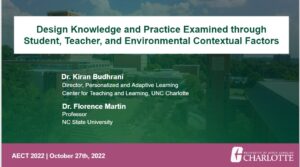
Kiran Budhrani & Florence Martin
The field of learning design encourages instructors to be designers of learning and engage in better design and planning of courses. This qualitative case study examines design knowledge frames and design practice through an analysis of lesson blueprints and instructor interviews. This presentation highlights three knowledge frames (i.e., student, teacher, environment) with influencing contextual factors that are inherent in instructor’s lesson design sequences.
Link to Slides – https://docs.google.com/presentation/d/1YDAnd55qKv1sQjPlbwsVIZ4VTUctW0iBR2e5v6QXTV4/edit#slide=id.gb85d33baa0_0_175
RTD- Center director on the roles and services provided by Centers of Teaching Excellence (CTE) in American universities
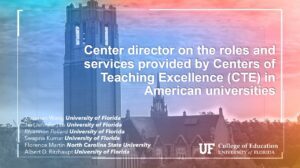
Xiaoman Wang, Jie Lu, Rhiannon Pollard, Swapna Kumar, Florence Martin & Albert Ritzhaupt
The purpose of this research is to provide insight into the contributions of CTEs by interviewing 12 university center directors based on different Carnegie Classifications. Data from semi-structured interviews were analyzed using the Constant Comparative Method. Our results explore organizational and operational factors, the services and models used to support stakeholders, and the roles and competencies of the CTE directors who are leading these centers. Discussion of the results is provided in the full presentation.
Link to Slides – https://uflorida-my.sharepoint.com/:p:/g/personal/xiaoman_ufl_edu/EXtMivat_cFKuhMgGA7HMGgBAjAAPx_qLWuq657n4vLLQw?rtime=xQ2xVgy82kg
- Categories:
